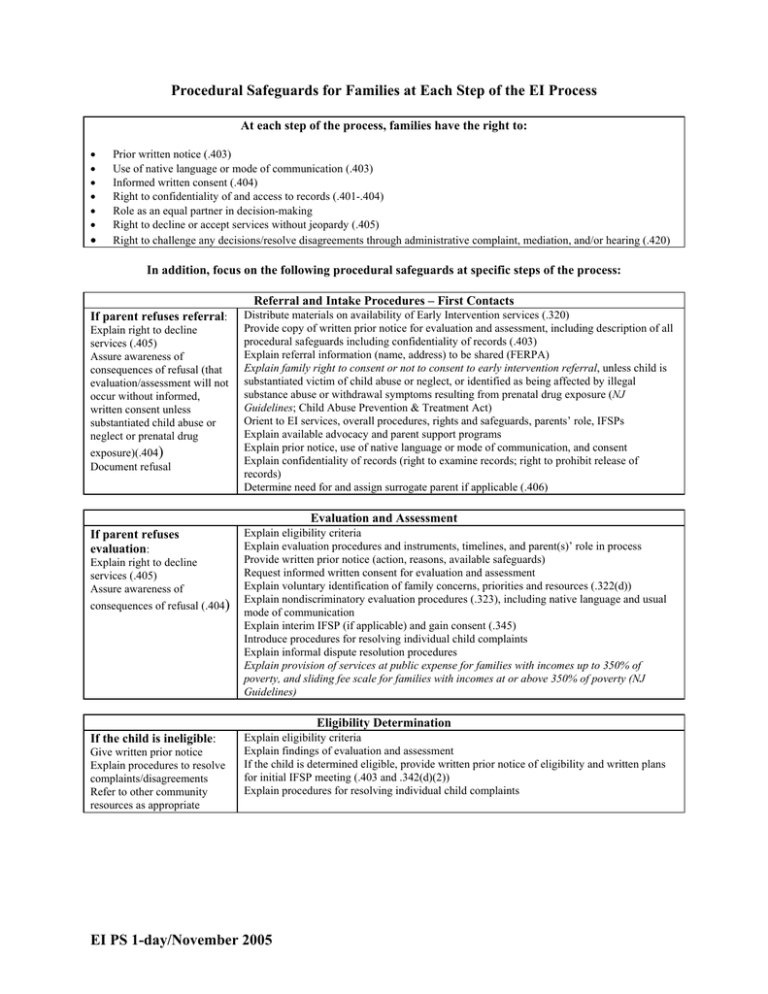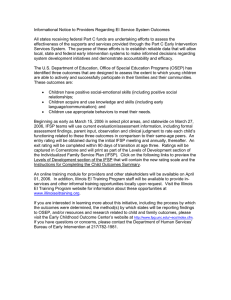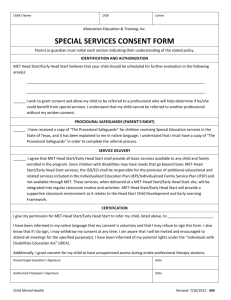Procedural Safeguards at Each Step of the Early Intervention Process
advertisement

Procedural Safeguards for Families at Each Step of the EI Process At each step of the process, families have the right to: Prior written notice (.403) Use of native language or mode of communication (.403) Informed written consent (.404) Right to confidentiality of and access to records (.401-.404) Role as an equal partner in decision-making Right to decline or accept services without jeopardy (.405) Right to challenge any decisions/resolve disagreements through administrative complaint, mediation, and/or hearing (.420) In addition, focus on the following procedural safeguards at specific steps of the process: Referral and Intake Procedures – First Contacts If parent refuses referral: Explain right to decline services (.405) Assure awareness of consequences of refusal (that evaluation/assessment will not occur without informed, written consent unless substantiated child abuse or neglect or prenatal drug exposure)(.404) Document refusal Distribute materials on availability of Early Intervention services (.320) Provide copy of written prior notice for evaluation and assessment, including description of all procedural safeguards including confidentiality of records (.403) Explain referral information (name, address) to be shared (FERPA) Explain family right to consent or not to consent to early intervention referral, unless child is substantiated victim of child abuse or neglect, or identified as being affected by illegal substance abuse or withdrawal symptoms resulting from prenatal drug exposure (NJ Guidelines; Child Abuse Prevention & Treatment Act) Orient to EI services, overall procedures, rights and safeguards, parents’ role, IFSPs Explain available advocacy and parent support programs Explain prior notice, use of native language or mode of communication, and consent Explain confidentiality of records (right to examine records; right to prohibit release of records) Determine need for and assign surrogate parent if applicable (.406) Evaluation and Assessment If parent refuses evaluation: Explain right to decline services (.405) Assure awareness of consequences of refusal (.404) Explain eligibility criteria Explain evaluation procedures and instruments, timelines, and parent(s)’ role in process Provide written prior notice (action, reasons, available safeguards) Request informed written consent for evaluation and assessment Explain voluntary identification of family concerns, priorities and resources (.322(d)) Explain nondiscriminatory evaluation procedures (.323), including native language and usual mode of communication Explain interim IFSP (if applicable) and gain consent (.345) Introduce procedures for resolving individual child complaints Explain informal dispute resolution procedures Explain provision of services at public expense for families with incomes up to 350% of poverty, and sliding fee scale for families with incomes at or above 350% of poverty (NJ Guidelines) Eligibility Determination If the child is ineligible: Give written prior notice Explain procedures to resolve complaints/disagreements Refer to other community resources as appropriate Explain eligibility criteria Explain findings of evaluation and assessment If the child is determined eligible, provide written prior notice of eligibility and written plans for initial IFSP meeting (.403 and .342(d)(2)) Explain procedures for resolving individual child complaints EI PS 1-day/November 2005 IFSP Meeting If parent declines any or all IFSP services: Explain procedures for resolving individual child complaints Explain right to accept or decline services without jeopardy Explain how to access services if desired in the future Plan IFSP meeting to occur within 45 calendar days from referral (.21(3)(2): provide written notice, timelines, participants’ convenience, accessibility, native language and mode of communication (.342(d)) Explain array of EI services and entitlements and right to services in natural environments Explain contents of IFSP and that services will not be initiated without prior written consent (342(e)); secure written consent required for services (.342(e)) Explain that services will be initiated as soon as possible, no later than 30 days from IFSP meeting Explain right to accept or decline services without jeopardizing services (.342(e) and .405) Explain procedures for resolving individual child complaints Acceptance and Implementation of IFSP If parent declines any or all IFSP services: Explain procedures for resolving individual child complaints Explain right to accept or decline services without jeopardy Explain how to access services if desired in the future Explain periodic review and annual review (.342) Explain changes in provision of services, required notice, and possible consent (for newly initiated services) (.403) Explain termination of services: prior notice (.403), child complaint procedures (.420) Explain agreed-upon services Explain that services will be initiated as soon as possible, no later than 30 days from IFSP meeting Explain right to accept or decline services without jeopardizing services (.342(e) and .405) Explain procedures for resolving individual child complaints IFSP Reviews If parent disagrees with results of IFSP review: Explain procedures for resolving individual child complaints Explain right to accept or decline services without jeopardy Explain how to access services if desired in the future Plan IFSP review to occur within 6 months and one year of IFSP development, and more frequently if conditions warrant or parent requests a review (.342(b)); provide written notice, timelines, participants’ convenience, accessibility, native language and mode of communication (.342(d)) Explain changes in provision of services, required notice, and possible consent (for newly initiated services) (.403) Explain termination of services: prior notice (.403), child complaint procedures (.420) Explain agreed-upon services Explain that new or revised services will be initiated as soon as possible Explain right to accept or decline services without jeopardizing services (.342(e) and .405) Explain procedures for resolving individual child complaints Transition If parent refuses consent to release records to or meet with district: Explain procedures for resolving individual child complaints Explain right to accept or decline services without jeopardy Explain how to access preschool services if desired in the future Explain transitions (.148 and .344(h)): prior notice, timelines, placement options, consent for record transfer (.401-.404) Explain transition information meeting with family and early intervention Explain transition information meeting to occur when the child is 24-30 months old Explain transition conference with the district, family, and early intervention Plan transition conference to occur at least 90 days and with parental consent up to 6 months before the child is eligible for preschool services (.148(b)(2)(i)); provide written notice, timelines, participants’ convenience, accessibility, native language and mode of communication (.342(d)) Explain importance of reviewing child and family records prior to transfer of records to the school district; explain right to prohibit transfer of some or all records, to delete or explain records Provide help for families to transition out of special services if appropriate Explain right to maintain IFSP services at district expense when the parent and district cannot agree on an IEP and the parent requests mediation or due process If the child may not be eligible for Part B services, make reasonable efforts to convene a conference among the family, early intervention and providers of appropriate community services (.148(b)(2)(ii)) EI PS 1-day/November 2005 Federal regulatory requirements are in regular typeface; New Jersey Guidelines requirements are in italics. EI PS 1-day/November 2005

